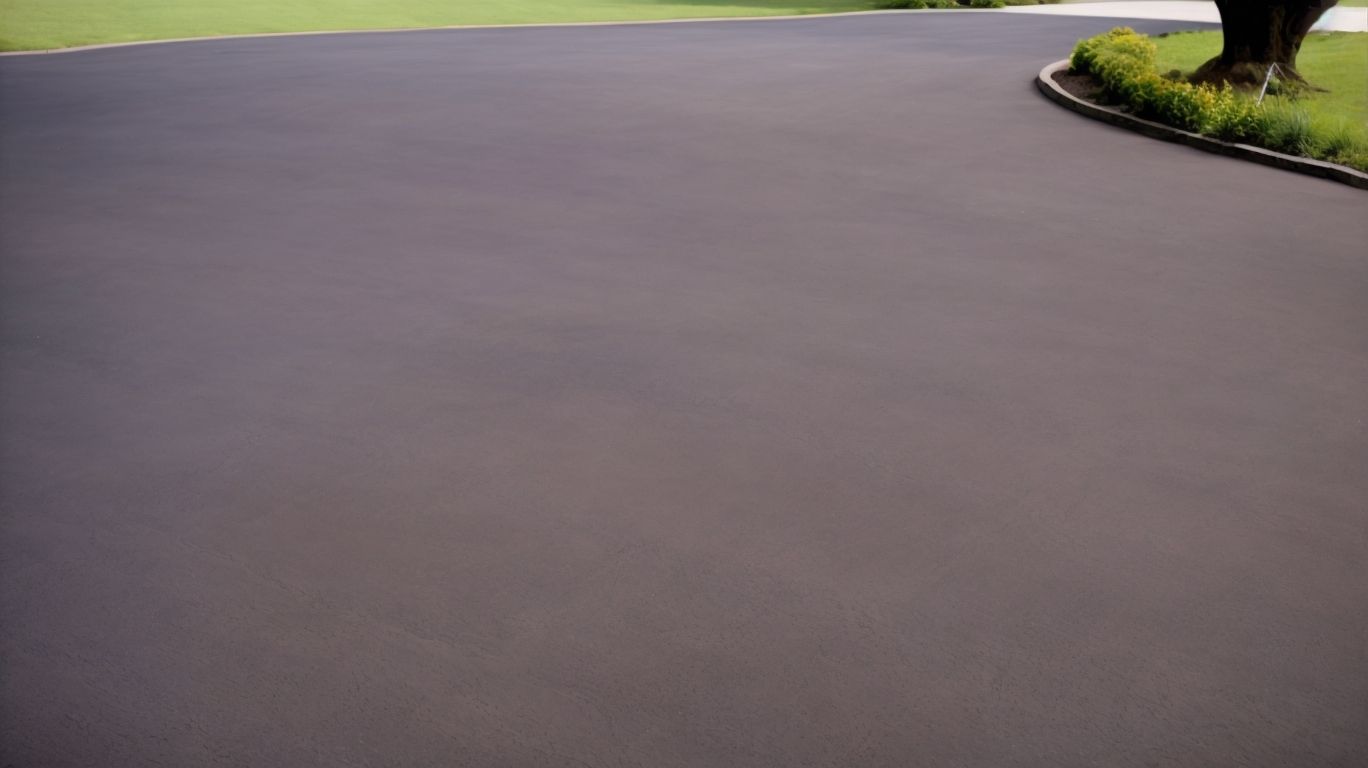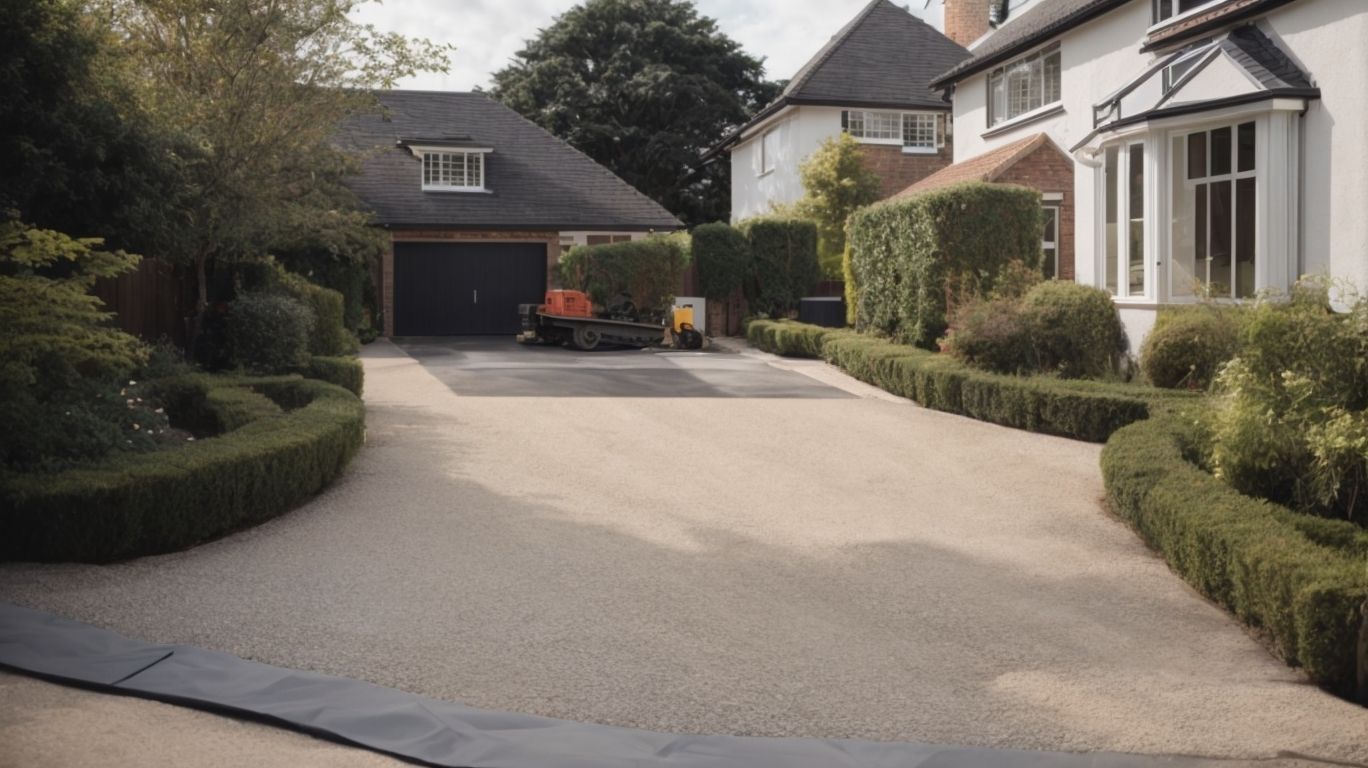Have you been considering upgrading your driveway but unsure of the best option for your home?
A tarmac driveway may be the perfect solution for you. We explore what a tarmac driveway is, its benefits, the cost associated with installation, the steps involved in the process, and how to choose a reliable contractor to get the job done.
Let’s learn more about this durable, low-maintenance, and cost-effective driveway option.
What Is a Tarmac Driveway?

Credits: Builduk-Newsline.Org.Uk – Jacob Wright
A tarmac driveway is a type of driveway that is paved with a material known as tarmac, providing a durable and cost-effective surface for vehicles to drive and park on.
Tarmac, also known as asphalt in some regions, is a composite material made from a mixture of mineral aggregates bonded together by bitumen. This combination creates a sturdy and weather-resistant driveway surface that can withstand heavy loads and diverse weather conditions.
Tarmac driveways are popular for their smooth finish, easy maintenance, and quick installation process, making them a practical choice for residential and commercial properties alike. The dark color of tarmac helps to absorb heat, making it ideal for cold climates as it aids in snow and ice melt during winter months.
What Are the Benefits of a Tarmac Driveway?

Credits: Builduk-Newsline.Org.Uk – Robert Wilson
Tarmac driveways offer several advantages, including durability, low maintenance requirements, cost-effectiveness, and quick installation, making them a popular choice for homeowners and businesses.
One of the key benefits of tarmac driveways is their exceptional durability, as they can withstand heavy vehicles and fluctuating weather conditions without deteriorating quickly. This longevity helps reduce the need for frequent repairs or replacement, saving homeowners and businesses both time and money in the long run.
The low maintenance requirements of tarmac driveways make them a convenient choice. Regular sweeping and occasional sealing are usually sufficient to keep them in excellent condition, requiring minimal effort and cost compared to other materials.
In terms of cost-effectiveness, tarmac driveways are relatively affordable to install initially, offering a budget-friendly option for those looking to enhance their property’s appearance and functionality. Their quick installation process means minimal disruption, allowing homeowners and businesses to enjoy their new driveway sooner rather than later.
Durability
Durability is a key feature of tarmac driveways, as the material’s robust nature ensures that the driveway can withstand heavy vehicle traffic and varying weather conditions over an extended period.
Tarmac driveways are highly resistant to wear and tear, making them an ideal choice for areas with high traffic volumes. The dense nature of tarmac prevents cracks and potholes from forming, maintaining a smooth surface for years to come. Tarmac’s weather resilience enables it to withstand harsh elements such as rain, snow, and UV rays without deteriorating, ensuring its longevity.
Low Maintenance
One of the significant benefits of tarmac driveways is their low maintenance requirements, as they do not require frequent repairs, sealing, or extensive cleaning to retain their appearance and functionality.
Compared to other driveway materials like concrete or gravel, tarmac driveways offer an advantageous combination of durability and ease of maintenance. The initial installation cost of tarmac driveways may be slightly higher, but the long-term savings become evident due to the minimal upkeep needed. To preserve the condition of a tarmac driveway, regular sweeping to remove debris and occasional power washing are usually sufficient. By addressing any cracks or potholes promptly, homeowners can prevent small issues from evolving into larger, costly repairs.
Cost-Effective
Tarmac driveways are known for being cost-effective, offering a budget-friendly option for property owners looking to install a durable and visually appealing driveway without breaking the bank.
One of the primary reasons tarmac driveways are considered cost-effective is their relatively low installation cost compared to other materials like concrete or block paving. Tarmac’s durability and low maintenance requirements contribute to its long-term value, reducing the need for frequent repairs or replacements that can incur significant expenses. When properly installed, tarmac driveways can last for many years, providing property owners with a cost-saving solution that enhances the overall curb appeal of their homes.
Quick Installation
Another advantage of tarmac driveways is their quick installation process, which minimizes disruption to the property and allows homeowners to enjoy a new driveway within a short timeframe.
Typically, the installation of tarmac driveways involves several key steps that contribute to their swift completion. The preparation of the driveway area is crucial, including clearing the existing surface and ensuring a stable foundation. Next, the hot mix tarmac is laid and compacted efficiently to create a durable surface. This process is known for its speed compared to other driveway options, as tarmac sets quickly, enabling homeowners to use their new driveway sooner rather than later.
Considering the time efficiency of tarmac driveways, property owners looking for a fast solution to enhance their property’s curb appeal and functionality often find tarmac an attractive choice. The durability and low maintenance requirements of tarmac driveways further add to their appeal, making them a cost-effective and convenient option for many homeowners.
How Much Does a Tarmac Driveway Cost?

Credits: Builduk-Newsline.Org.Uk – Logan Lewis
The cost of a tarmac driveway varies depending on factors such as square footage, material quality, labor expenses, and any additional design features or customization options chosen by the property owner.
When determining the overall price of installing a tarmac driveway, the square footage plays a crucial role as it directly impacts the amount of materials needed and the labor hours required for installation. High-quality tarmac material will undoubtedly increase the cost, but it also ensures durability and longevity, making it a worthwhile investment in the long run. Labor expenses vary based on the complexity of the project and the skill level of the workers involved.
Opting for additional design features like borders, patterns, or customized finishes can significantly elevate the overall cost but can also enhance the aesthetic appeal of the driveway. On average, the cost of a tarmac driveway installation ranges from $50 to $80 per square meter, but this can vary depending on location, contractor rates, and specific project requirements.
Factors Affecting the Cost
Several factors influence the cost of a tarmac driveway, including the driveway’s size, the quality of materials used, the complexity of the installation process, and any additional design elements or features incorporated.
The size of the tarmac driveway plays a pivotal role in determining the overall cost, as larger driveways require more materials and labor, thus increasing expenses significantly. The quality of materials, such as the type of tarmac mix and its durability, directly impacts longevity and maintenance costs. The complexity of the installation process, including factors like terrain, drainage requirements, and existing groundwork, can add substantial expenditures. Incorporating design elements like borders, patterns, or edging details can enhance aesthetics but also contribute to the total cost.
Average Cost for Different Size Driveways
The average cost of tarmac driveways varies based on the size of the driveway, with smaller driveways typically costing less than larger ones due to the amount of materials and labor required.
For a small tarmac driveway covering approximately 25 square meters, homeowners can expect to pay between $1500 to $2500. On the other hand, a medium-sized driveway spanning around 50 square meters might cost anywhere from $3000 to $5000. As for large tarmac driveways exceeding 100 square meters, the prices can range from $6000 to $10000 or more.
Cost-saving measures such as opting for a thinner tarmac layer or choosing a simpler design can help reduce expenses without compromising on quality. Scheduling the installation during off-peak seasons or bundling the driveway project with other services can also lead to potential savings.
What Are the Steps in Installing a Tarmac Driveway?
The installation of a tarmac driveway involves several key steps, including preparing the area, laying the base, applying the tarmac material, and compacting and finishing the surface to create a smooth and durable driveway.
Preparation is crucial for the success of your tarmac driveway project. Start by clearing the site of any debris and vegetation, ensuring a clean slate for construction to begin.
Next, establish the correct gradient to allow proper water drainage, preventing water accumulation on the driveway’s surface. Once these initial steps are completed, the base layer, typically comprising crushed rock or hardcore, must be carefully laid and compacted to provide a stable foundation.
Preparing the Area
The first step in installing a tarmac driveway is preparing the area, which involves clearing vegetation, leveling the ground, and addressing any drainage issues to create a stable foundation for the driveway.
Site clearance is crucial to remove any obstacles such as rocks, debris, or vegetation that could hinder the installation process.
Once the site is clear, ground leveling is carried out to ensure a smooth and even surface for laying the tarmac.
Drainage considerations play a vital role in preventing water accumulation, with solutions like installing drainage channels or using permeable tarmac.
Soil compaction techniques, such as using a plate compactor, are then employed to compact the soil and create a solid base for the driveway.
Laying the Base
Once the area is prepared, the next step in installing a tarmac driveway is laying the base, typically composed of crushed stone or gravel, to provide a stable and well-drained foundation for the tarmac surface.
When selecting materials for the base, it is crucial to choose the right size of crushed stone or gravel to achieve the desired thickness and stability. A commonly recommended thickness for the base layer is around 4 to 6 inches, but this can vary depending on the specific soil conditions and intended use of the driveway.
Proper compaction of the base material is essential to prevent settling and ensure a solid foundation, which can be achieved using a vibrating plate compactor or roller to achieve the required density.
Applying the Tarmac
The application of tarmac is a crucial step in driveway installation, where the hot tarmac mixture is poured and spread evenly over the prepared base to create a smooth and level surface for the driveway.
Before the pouring begins, it is essential to ensure that the tarmac mixture is at an optimal temperature that allows for proper adhesion and consistency. This typically ranges between 160°C to 190°C, which ensures the mixture is workable but not too hot.
During the pouring process, the hot tarmac is spread methodically using specialized equipment to achieve an even thickness across the entire driveway surface. Ensuring proper compaction is crucial to prevent future cracking and sinking.
To finish, a final touch of rolling the surface with a heavy roller helps to further compact the tarmac, creating a durable and smooth finish that enhances the overall appearance of the driveway.
Compacting and Finishing
The final steps in installing a tarmac driveway involve compacting the tarmac surface to enhance durability and smoothness, followed by finishing touches such as edging, sealing, and line marking to complete the driveway’s appearance.
Proper compaction is crucial as it ensures the tarmac settles evenly, reducing the risk of future cracks and dips. Different compaction methods like using a roller or a plate compactor may be employed based on the project size and requirements. Surface sealing is essential to protect the tarmac from weather elements, oil leaks, and UV rays, extending its lifespan. Paying attention to aesthetic details like edging with bricks or stones, and line marking for parking spaces enhances the overall look of the driveway.
How to Choose a Reliable Contractor for Your Tarmac Driveway?

Credits: Builduk-Newsline.Org.Uk – Wayne Perez
Selecting a reliable contractor for your tarmac driveway is crucial to ensuring a successful installation process and a high-quality finished product that meets your expectations and budget requirements.
When determining the credibility of a contractor for your tarmac driveway, one of the key aspects to consider is their accreditation verification. Ensure that they are certified by reputable bodies in the industry, such as the National Asphalt Pavement Association (NAPA) or the Better Business Bureau (BBB).
Additionally, comparing quotes from multiple contractors can help you gauge the market rates and identify any outliers in terms of pricing. It’s also advisable to delve into customer reviews and assessments to get a sense of the contractor’s reputation and past performance.
Don’t overlook the importance of checking their insurance coverage to safeguard yourself against any unforeseen contingencies during the driveway installation process.
Check for Accreditation and Experience
When evaluating contractors for your tarmac driveway project, prioritize checking their accreditation, certifications, and industry experience to ensure they have the necessary expertise to deliver a quality installation.
Accreditation serves as a crucial validation of a contractor’s adherence to industry standards and best practices. Certified contractors demonstrate a commitment to quality and professionalism, showcasing their competence in handling tarmac driveway projects.
Experience plays a significant role in honing skills and problem-solving abilities, ensuring that the contractor can navigate challenges effectively during the installation process. Reviewing the contractor’s project portfolios offers insight into their past work, allowing you to assess the quality and complexity of their previous tarmac projects.
Customer testimonials provide valuable feedback on the contractor’s reliability, communication, and overall satisfaction of the project execution.
Get Multiple Quotes
Obtaining multiple quotes from different contractors for your tarmac driveway project allows you to compare pricing, services offered, and project timelines to make an informed decision based on value and quality.
This process of gathering quotes not only provides you with transparency on pricing structures but also exposes you to the range of services included in each contractor’s offer. By receiving multiple estimates, you can also potentially negotiate better terms, such as payment plans or added benefits, ensuring that you get the most competitive deal for your project. Soliciting various quotes helps you gauge the professionalism and expertise of each contractor, giving you confidence in selecting a reliable and skilled team for your driveway construction.
Read Reviews and Ask for References
Reading reviews and seeking references from past clients of tarmac driveway contractors can provide valuable insights into the contractor’s reputation, work quality, and customer satisfaction levels.
When vetting tarmac driveway contractors, reviews can serve as a window into the experiences of previous customers, offering a glimpse into the contractor’s reliability and professionalism. Requesting references directly from the contractor allows for a more personal touch, enabling you to directly connect with those who have first-hand knowledge of the contractor’s work ethic.
- During the review assessment process, pay attention to consistency in feedback, especially concerning workmanship, adherence to timelines, and overall project management.
- Be wary of any red flags such as unresolved disputes, lack of licensing, or negative patterns in feedback that suggest potential issues.
By meticulously evaluating reviews and references, you can make informed decisions when selecting a tarmac driveway contractor.
Ask About Insurance and Warranties
Before engaging a contractor for your tarmac driveway, inquire about their insurance coverage and warranty policies to ensure protection against unexpected liabilities, property damage, or workmanship issues that may arise during or after the project.
Insurance and warranties play a vital role in safeguarding your interests and investments when undertaking a tarmac driveway project. Contractor insurance provides financial coverage for accidents, injuries, and damages that may occur on your property or due to the contractor’s work. On the other hand, warranties offer guarantees on the quality and longevity of the completed driveway. It’s crucial to understand the coverage types, such as general liability insurance and workmanship warranties, as well as the durations and claims procedures associated with each to ensure comprehensive protection for your project.
Frequently Asked Questions
What is the average cost of a tarmac driveway?
The average cost of a tarmac driveway can vary depending on several factors such as the size of the driveway, location, and additional features. However, on average, you can expect to pay around $4,000 to $6,000 for a standard tarmac driveway.
Are there any additional costs associated with installing a tarmac driveway?
Yes, there may be additional costs such as excavation and preparation of the site, drainage systems, and sealing the tarmac. These costs can add up to an extra $1,000 to $2,000 to the overall cost of the project.
How long does a tarmac driveway typically last?
A well-maintained tarmac driveway can last anywhere from 15 to 20 years. However, the lifespan can vary depending on usage and climate conditions. Regular maintenance and repairs can also help prolong the life of your tarmac driveway.
Can I install a tarmac driveway myself to save on costs?
It is not recommended to install a tarmac driveway yourself as it requires specialized equipment and skills. Improper installation can result in a driveway that is uneven, prone to cracks, and may need to be redone, costing you more in the long run.
What factors can affect the cost of a tarmac driveway?
The size and shape of the driveway, the thickness of the tarmac layer, any additional features such as curbs or edging, and the type of tarmac used can all affect the overall cost. Additionally, the location and accessibility of your property can also impact the cost.
Are there any long-term cost benefits of choosing a tarmac driveway?
Yes, there are several long-term cost benefits to choosing a tarmac driveway. Tarmac is a low-maintenance material, requiring only occasional sealing and repairs. It is also a durable and weather-resistant option, saving you money on frequent replacements or repairs in the future.